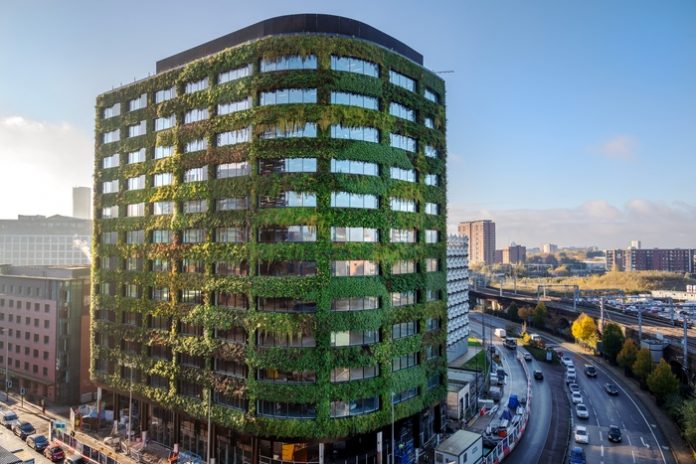Eden – the £36 million, 115,000 sq ft 12-storey office building in New Bailey, Salford – developed by The English Cities Fund (ECF), has reached practical completion. With the highest NABERS UK Design Reviewed Target Rating for a new-build development in the UK to date and the largest living wall in Europe, Eden is one of the UK’s most sustainable office buildings, designed using the UK Green Building Council’s 2030 – 2035 standards and with the capability to run on 100% renewable electricity.
Developed on a former derelict surface car park, Eden demonstrates the potential harnessed by ECF (a development company set up by urban regeneration specialist Muse, Homes England, the Government’s housing and regeneration agency and investors Legal & General) to transform urban areas and create exceptional new places.
Eden’s pioneering, holistic approach to sustainability was a significant factor in attracting both TLT and BDO to one of the region’s most sought-after commercial neighbourhoods.
Challenged by ECF to deliver the most sustainable, carbon-efficient building achievable within the budget and the constraints of the site, architects Make designed the 12-storey office development with an upfront embodied carbon rate of 664kg CO2/m2 as compared with over 1,000kgCO2/m2 for a typical office scheme. The design team is also aiming for the building to achieve a 5.5-star NABERS UK (National Australian Building Rating System) Energy Rating once the in-use data is available, with ‘green lease’ agreements in place to ensure that the tenants are also on board with the vision for the building.
Working closely with ECF and consultants Cundall, Make took a fabric-first approach to reduce carbon emissions by reducing and reusing materials wherever possible. The building has a 60:40 solid to glazing ratio and is insulated using Passivhaus principles. Air source heat pumps provide low-carbon heating, hot water and cooling, and the team avoided constructing a basement – a key move which considerably reduced embodied carbon emissions. To maintain the living wall, the design team came up with an irrigation system that uses rainwater harvested from the building’s roof.
Eden’s most noticeable design feature is its living facade, which covers over 36,000 sq ft of the building with 32 species of evergreen and perennial planting. Designed in collaboration with living wall specialists ANS, this major piece of green infrastructure – the largest living wall in Europe at the time of completion – makes a distinctive contribution to a community short on green spaces.
With over 350,000 plants, the green elevations make a dramatic and unusual addition to the urban realm, easily identifiable from a distance and within the boundaries of the New Bailey area itself. The living wall also removes air pollutants, lowers urban temperatures, and improves biodiversity in Salford.
Phil Marsden, Managing Director North West for Muse, comments: “Watching Eden emerge on Salford’s skyline over the last two years has been an incredible journey. What started as an ambition to build the UK’s most sustainable and environmentally considerate commercial building became so much more. We take our learnings from Eden onto our future projects where we strive to do even better. Everyone involved in Eden should be incredibly proud.”
Salford City Mayor, Paul Dennett, adds: “With its pioneering sustainability credentials and incredible façade, Eden isn’t just a local legend, it is a national icon, that we are truly proud of. It’s a beacon of our city’s carbon neutrality commitments, it provides a blueprint for the future for the construction sector and is another bold testament to our city’s reputation for innovation. This unique building and the positive visual impact it has had on the city’s skyline is a reflection of the inspiration and drive we have in Salford to think differently and innovate to make Salford a cleaner, greener, healthier place to live and work.”
Stuart Fraser, lead architect, Make, added: “We were so thrilled to get the 5.5-star NABERS Design Reviewed Target Rating, which is such a simple and robust system for office developers to really know what their buildings can achieve operationally. Alongside that, we’ve exceeded the UK Green Buildings Council’s 2030–2050 office base-build energy performance target, achieving 41kWh/m2/yr – a high target when compared with the NABERS targets of 55kWh/m2/yr for 5.5 stars and 35kWh/m2/yr for 6 stars – and we’re set to achieve BREEAM Outstanding and WELL Platinum.”
Simon Wyatt, Sustainability Partner at Cundall, commented: “When we embarked on this project, the aspiration to make Eden ultra-sustainable with ambitious energy and embodied carbon targets was out of the ordinary. We spent a lot of time working with Make to make sure it was aligned with energy targets and included methodology for how they would be achieved. We also incorporated Muse’s aspirations to meet ESG targets around biodiversity net gain, health and wellbeing, social value, and of course, net zero carbon. The result as we come to completion is a best-in-class development that will be the ‘greenprint’ for the next generation of net zero buildings.”
Eden is a key part of ECF’s £1bn regeneration of the Salford Central area of the city into a diverse mixed-use destination, complete with a bustling commercial district, alongside a vibrant community of homes and amenities, to provide something to suit everyone’s needs. Retained letting agents on the building are JLL, Cushman and Wakefield and OBI.



















